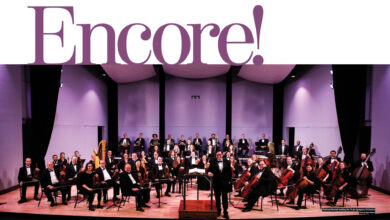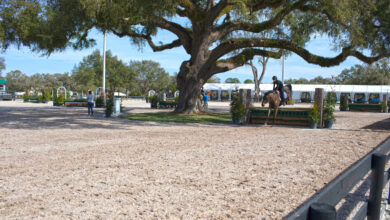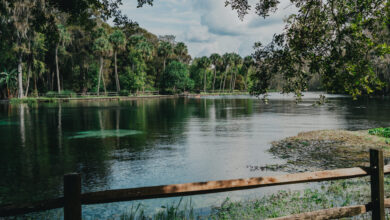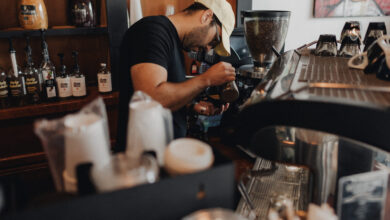Majestic views of the Black Sea and Fisht Mountain will be the backdrop for U.S. long track speed skaters Brittany Bowe and Joey Mantia as they walk into Fisht Olympic Stadium in Sochi, Russia for the opening ceremonies of the 2014 Winter Olympics.
The view for Bowe and Mantia 18 years ago and some 6,200 miles away from Sochi, in their hometown of Ocala, was a lot different. They saw world-renowned coach, Renee Hildebrand, pushing them to be their best every day. They saw a once deteriorating Skate Mania facility, on Maricamp Road, revitalized by Sandy and Ralph Lopez so they could keep training. They saw their parents making sacrifices for them, providing for them and guiding them into what was initially an unknown sport – a sport that turned them into international superstars as young teenagers. They saw a town, known for its horse industry. They saw that one day this town would realize what they had accomplished through extraordinary efforts and determination, even before making it to Sochi.
Who would have thought of a sundrenched city in North Central Florida delivering not one but two winter Olympians?
“There isn’t an ice rink within 90 miles of Ocala,” said Mantia. “There isn’t a long track within 1,000 miles, yet Brittany and I make the U.S. Olympic team for long track speed skating? That is the wildest thing in my mind!”
By trade Renee Hildebrand is a physical therapist. That is her Monday through Friday, 9 to 5 job. But it is what she does after hours and on the weekends, that has helped Hildebrand make a name for herself.
The name Renee Hildebrand is gold in the inline skating world. Hildebrand’s coaching clout is on the same level as University of Tennessee women’s college basketball coach Pat Summit and San Francisco 49er’s coach Bill Walsh. Yet because inline skating is not even on the radar in American sports, Hildebrand is unknown in her own country. In Colombia, Belgium, and China, where spectators pack the streets for marathon inline skating competitions and the winner makes the front page of the paper, she is revered.
“I wanted to coach skating, but because I was never a world champion, or even a national champion, I didn’t think I had the stock to be a coach,” said Hildebrand, who was a teenage rink rat in her hometown of Charleston, South Carolina.
Instead, Hildebrand went to the University of Central Florida for athletic training and then immediately to the University of Florida for physical therapy school. In that six-year time period, from 1980 to 1986, she got her skating fix assisting coaches part time. She had her own skating team based out of a Brooksville rink just a few months after finishing in Gainesville. She had aspirations to be a better coach and help develop skaters into national champions. Fortunately, she didn’t have to go far to find help. Just 30 minutes away from Brooksville, in Hudson, were Virgil and Sue Dooley, the top coaches in the sport at the time. The Dooleys coached several USA World Team members. Sue Dooley was once a world champion herself.
“I had some coaching experience early on,” Hildebrand said. “My first memory was when I had that little team and we wound up beating the Dooley’s team. We were the smallest rink in the area – kind of the underdog.”
When Hildebrand went to meet with Virgil and Sue Dooley, they said, “Oh, we know who you are. Your little team just beat us last week!” It made Hildebrand feel good that they accepted and recognized her.
Coaching alongside the Dooleys in 1987 proved to have the biggest impact on Hildebrand.
“That gave me a big leg up,” Hildebrand explained. “I learned things right away that would have taken me years to learn otherwise. It gave me a big boost.”
Central Florida CommunityCollege, as it was once known, hosted a basketball camp for kids. One particular camper was out of control during one a session. Unintimated, this camp’s little menace continually took a basketball away from an older girl.
Hildebrand went over to a gentleman in the crowd, not knowing he was the menace’s father, and asked if he could “remove that little boy from the group.”
“That is my daughter,” said the man, who just so happened to be Brittany Bowe’s father, Mike Bowe. That was Hildebrand’s first introduction to Bowe.
Two months later, Coach Hildebrand was waiting for a kid’s birthday party at Skate Mania to clear the rink so her team could practice. She recognized one of the party-goers.
“There was that spunky little girl, with that bob haircut, from basketball camp,” Hildebrand recalls. “She was trying really hard on her roller blades, pushing herself as fast as she could.”
The then 7-year-old Bowe had no idea she was being scouted.
“Coach Hildebrand approached me and said, ‘You look like you have some potential. Have you ever heard of speed skating? Why don’t you come out to a practice and see how you like it?’” Bowe recalls some 18 years later. “It was all a coincidence.”
Hildebrand’s physical therapy job brought her to Ocala in 1993. Coincidently, it was once again outside of the skating rink where Hildebrand first met another athletically gifted kid with a lot of spunk, Joey Mantia.
“Joey was so good at gymnastics that he excelled above the rest of the kids in his group,” said Joey’s Dad, Joe Sr. “When the teacher told us that Joey couldn’t get enough individual attention, because it was a group class, it left a bad taste in his mouth.”
Mantia, who was two years older than Bowe, took to skating instead. He looked and played the part well with Skate Mania becoming his second home.
“He was flying around the rink; he was just so quick,” Hildebrand said of her initial assessment of Mantia.
Classified as a menace on the rink, as was Bowe was on the basketball court, Mantia was more than just a pretty good public session skater.
“The referees…would constantly kick me off the rink for five minutes at a time for skating too fast,” said Mantia.
He goes on to say, “There were races. And after winning enough of those races the referees had me start back 10 feet, then a quarter of a lap back, then half of a lap back, to be fair. I really liked the challenge of the public skating sessions.”
Both Mantia and Bowe’s athletic talents and drive didn’t fall far from the tree. Joe Mantia wrestled in college. After moving to Ocala, he started working at fitness gym. Intrigued by one of the gym’s power lifters, Joe Sr. lifted competitively in the American Drug Free Power Lifters Association for ten years. On the other hand, Brittany’s mom, Debbie, is in the Baton Twirling Hall of Fame. Bowe’s father, Mike, a high school coach of 30 years, was one of seven children. He played both football and basketball at a Division III school in upstate New York. Five of Mike’s siblings played some sort of collegiate sport as well.
The speed, enthusiasm and athletic stance both Bowe and Mantia’s kids showed on the rink was what Hildebrand adored. She could mold them; teach them technique, form and strategy. Mantia was so good, that in just three weeks of practice, Hildebrand deemed Mantia ready for competition on her Team Florida squad.
No referees were whistling him off the rink for going too fast that day, back in 1995. Mantia won that race. And not only did he win, he beat the reigning 9-year-old national champion Chad Weldon.
“Well, he really is a speed skater,” Joe Sr. recalled saying to Hildebrand after the race.
Debbie Bowe was a little concerned during her 7-year-old daughter’s first competition, a regional championship in Pensacola.
“I remember sitting in the corner of the arena thinking please don’t get hurt,” Debbie said. “Also, I really had no idea what she was doing. I’ve been to basketball and soccer games where I had at least some clue what those sports entailed. But this? No so much.”
Yet a solid finish in Pensacola led to Bowe’s first national championship in Nebraska just months later.
It was evident that within a few months of working together, the teaching prowess of Hildebrand and the sheer athleticism and drive of both Mantia and Bowe blended perfectly.
“I always wanted to impress her, “explained Mantia. “I would say I’ve gotta impress Renee, I gotta impress Renee.” Hildebrand gave Mantia indirect motivation. She had an aura about her. One that Bowe recognized too.
“There was a feeling of never wanting to let Coach Hildebrand down,” Mantia explains. “That was the initial spark that got us going.”
Hildebrand wore a necklace with a tiny hammer on it. Her team members all touched the hammer before events started. As Hildebrand put it, race time was the time to “put the hammer down.” Mantia and Bowe became Hildebrand’s best skaters. They were referred to as “Renee’s golden two.”
Mantia describes it, using a Hildebrand impression, saying it was, “Joey and Brittany this – Joey and Brittany that.” But to Mantia and Bowe, it was simply about having fun together, both on and off the track.
“They were friends that shared a love for skating,” said Joe Sr. “Our families hang out too. During holidays and birthdays we all got together.”
The Bowes and Mantias are an extended family with Hildebrand also being very much part of their families.”
Even when it came time for practice, Bowe and Mantia were close – literally.
“We were 13 or 14, perhaps younger, practicing outdoors at Coehadjoe Park.” Mantia recalls. “I’d say we were going 25 mph when I fell in front of Brittany. She went flying over the top of me. We were both just covered from head to toe with road rash. I woke up in the middle of the night stuck to my sheets. The road rash and the pus from the scars were sticking to the sheets.”
The bumps and bruises weren’t anything new. A couple years before, Mantia was called to his middle school principal’s office after a teacher discovered a huge bruise on his hip and leg. The school thought his parents were abusing him.
“No!” Mantia exclaimed. “I’m a roller skater. This happens all of the time!
New opportunities awaitedOcala’s best kept secrets. Important decisions had to be made. Both Bowe and Mantia got contracts offers from skating equipment companies. Bowe was just 10 years old when she was first offered hers.
Bowe’s first offer came from Kerjean, a skating company based out of Miami. The second one came from Verducci, which is a boot company based in Italy. It was an opportunity for Bowe to get uniforms and wheels.
Bowe, along with Jessica Smith (now a short track speed skater) and Julie Glass, the wife of Verducci U.S. rep Doug Glass, were known as the Verducci girls in the skating world. The Verducci contract provided Bowe with financial backing as well as great competition and camaraderie.
“Brittany was 5 years younger than Jessica and she’d get thrown into the competition with these bigger girls,” said Debbie Bowe. “We were just laughing about that at the Olympic trials in Salt Lake City.”
Brittany’s first timealone on a plane was when she was going to race a marathon in California. It was Doug and Julie Glass that went to get Brittany from the airport.
Verducci and two other skating companies, Hyper and Powerslide, signed Mantia to contracts as well.
Hildebrand pushed the envelope. She put Bowe and Mantia in outdoor competitions so that they could make the U.S. outdoor national team because a national indoor team didn’t exist. Hildebrand went by herself to the national outdoor track in Colorado to coach for two weeks. Then she took the boldest step of her coaching career in 2001 by spending six weeks in, of all places, Colombia.
“The kids in Colombia are super quick,” explains Hildebrand. “I saw firsthand how great the competition was there.”
Hildebrand watched how quickly Mantia and Bow progressed and knew that there had to be something a even more challenging for them. They were winning anywhere from first place to fifth place all of the time.
The idea of Competing internationally was initionally met with some hesitation but it changed Mantia and Bowe forever.
Competing internationally made Mantia and Bowe more successful than anyone else during their time in inline. The success came from the experience of racing internationally and from international skaters coming to the states to train. Hildebrand’s athletes got international experience right here at home.
Mantia’s first ever world championship race in Belgium was when he was 15 years old. “It was my birthday,” Joe Sr. recalls. He was in the street with thousands of people.
Mantia had just won the marathon, beating kids from Australia who were favored. No one knew who Joey Mantia was.
“They played the National Anthem and put him on the podium,” Mantia’s father reminisces. “Joey jumped down, skated over to me, put his gold medal around my neck and said, ‘Happy birthday, Dad. I love you’.”
Bowe’s attention came after her big international win in Colombia.
“We’ve been to Colombia three times,” said Debbie. “People line up for her autograph. Kids wanted her wheels or her shirt. Brittany even gave her gold medal to a one little girl.”
The day after Bowe’s victory, on the front page of the local Colombian paper, was a big photo of Bowe along with the story of the race.
“When I would leave Ocala to go to South America, Europe or Asia, it was like I was entering a completely different world,” recalls Bowe, who is well known and looked up to by a lot of people.”
Mantia and Bowe were the modern day Justin Timberlake and Taylor Swift of the inline skating world.
Wins in Belgium and Colombia were just two of nearly 60 gold medals Mantia and Bowe combined to win in national, international and world championship skating events – An unthinkable and dominating accomplishment.
“He is a workhorse,” Hildebrand said of Mantia. “Joey works harder than anyone I have ever seen in my life. He never got tired of practicing and always wanted to do more. Joey even got made fun of by the other athletes because he was so focused. He never saw it as just a social sport.”
Instead of hanging out at high school parties on weekends, Mantia practiced even more after already having two-a-day sessions.
Mantai can remember going out at midnight one weekend, just skating around the roads of Ocala, to get extra training.
Imagine this kid in spandex and no shirt, hauling ass, 25 or 30 mph, down the road. On a couple different occasions, cops pulled up next to Mantia. Sometimes cars would drive up next to Mantia and give him a look like if to ask, “What in the hell is going on?”
Hildebrand also brags on her female superstar. “Brittany is probably one of the most mentally tough people I have ever met,” declares Hildebrand. “If she sets a goal she is going to do it.”
Being a WNBA basketball player was one of her goals and somehow it got worked into her already tight schedule.
“From sunrise to sunset I was on the move,” said Bowe. “There was just enough time between basketball practice (3:30 to 5:30 p.m.) and inline practice (7 to 9:30 p.m.) to get a quick bite to eat.” By the time Bowe would get home, she was exhausted. Then, she’s wake up the next day to do it all over again. Bowe says with sincere honesty, “There wasn’t one day that I was fed up enough with something that I ever wanted to give up.”
A fork in the road split Mantia off in one direction and Bowe off in another.
Mantia’s first pro contract came his senior year, while at Vanguard High School. He was also getting a stipend to go around the world and skate. For Mantia, it was a legit career and his father, Joe Sr. agreed.
Despite relatives saying he should go to college, reminding him that he could get hurt, Mantia had his mind made up and his father Joe Sr. was completely behind his son’s decision.
Similarly, Bowe freely admitted that what she accomplished on skates, in her high school years, was more impressive than what she ever did on the basketball court at Trinity Catholic. Still, being the Class 3A Player-Of-The-Year Runner-Up and holding the school record in points (1,869), assists (839), steals (611) and three-pointers (198) is nothing to sneeze at. Bowe accepted a full basketball scholarship from Florida Athletic University while Mantia grew into even more of a inline skating phenomenon.
“Joey represented really well so the sponsors loved him,” said Joe Sr. “They would pay him to win gold medals and to get to the world championships. If he won gold at the world championship there would also be a bonus for that.”
Mantia’s stipend kept doubling each year from the time he left high school in 2004. On the hardcourt at FAU, from 2006 to 2010, Bowe proved to be a tremendous college basketball player. She was a team captain, became an all-Sun Belt Conference player and was one of just nine players in Owl’s history to score 1,000 career points or more.
A major decision was made Oct 6, 2009. This decision wasn’t made by either Mantia or Bowe yet it changed both of their futures forever. The International Olympic Committee or IOC did not vote inline skating as one of the two sports that would be added to the 2016 and 2020 summer Olympic Games. Golf and rugby got the nod instead.
Mantia would have been a favorite in several Olympic inline skating events. Chatter amongst Mantia and his fellow competitors was about making “the switch.” A lot of the same techniques needed for speed skating on ice are also used by inline skaters. After the IOC decision, Mantia continued to compete in inline but threw himself onto the ice to feel it out.
Mantia’s coach told him, “You are great, Joey. But if you want to be the best, you have to choose one or the other. You have to make a decision.” Part of Mantia’s mind was made up. Inline skating was becoming a little redundant.
“For my own sanity I needed to switch it up,” said Mantia. “I needed motivation to do something else. I had three years, from 2010 to 2013, to figure out how to get on the ice. The move was the most logical – What can I become the best at in the shortest amount of time?”
Mantia’s choice – Speed skating. He continued to contemplate what to do next. Four months after the IOC’s decision, the 2010 Winter Games took place in Vancouver. Watching the speed skaters zip around the ice oval while sitting on his couch, Mantai finalized his decision to make “the switch.”
Thousands of miles away, Bowe watched the same skaters zip around the Vancouver rink. Removed from the majority of any skating for over two years, her memories of inline all came rushing back to her – The speed, the exhilaration, the competition. She would be done with basketball in a little over a month.
“It was five months later, the summer of 2010, when I could actually picture where I was going to be,” said Bowe. “What I was picturing was being at the Olympic games.”
It has been nearly 20 years when Hildebrand first saw the sheer determination of two little kids zipping around Skate Mania’s floor. That same innate quality in both Mantia and Bowe got them to make the transition from inline to ice, earning them the right to be called Olympians.
“Some people have been on the ice all of their lives,” said Hildebrand “Then, here comes Brittany and Joey, who switch over and within just three years of practice, they beat them.”
Mantia and Bowe are both amazing athletes and amazing people,” boasts Hildenbrand. “They stay focused on their life. For young kids they can’t be beat.”
God willing, Joe Sr., who worked three jobs at times to support Joey early on, will be in Sochi. Debbie Bowe, the Team Florida mom/manager, who for years scheduled her vacation time around her daughter’s skating schedule, will have a crucifix in her hand as she watches from Sochi. Mike Bowe will hand his coaching whistle to his assistant coaches, who will continue to guide his team the rest of the way the playoffs, so he can be amongst that proud crown in Sochi.
Amid the gorgeous backdrop of the Black Sea and Fisht Mountain, the view that Joe Mantia Sr. and Debbie and Mike Bowe will see on the ice oval will also be spectacular.






